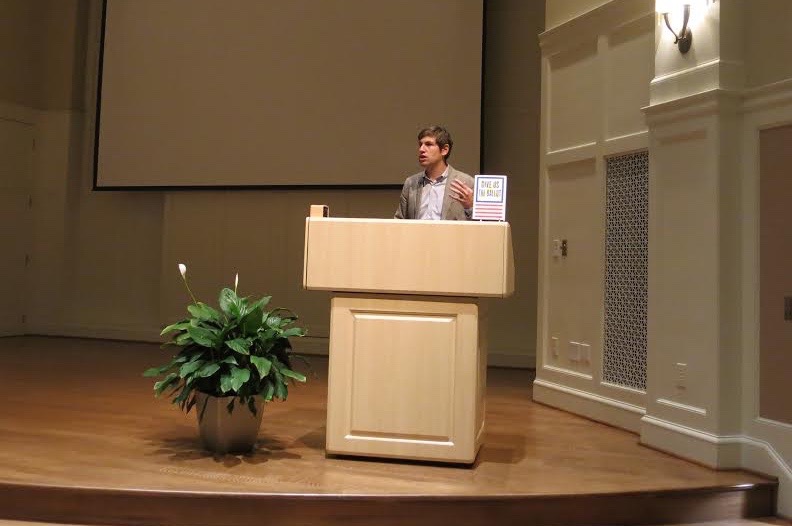On Wednesday, Dec. 2, prominent journalist and author Ari Berman delivered a lecture to the Wake Forest community regarding voting rights in America, sponsored by the Pro Humanitate Institute, Student Government, the Arch Society, College Democrats and No Labels.
Berman, an investigative journalism fellow at the Nation Institute and writer for The Nation, has a degree in journalism and political science from Northwestern University.
In his address on campus, Berman discussed the integral role voting plays in our democracy as well as the history of the civil rights era and the legislation aimed at protecting those rights which resulted. Berman’s new book, Give Us the Ballot: The Modern Struggle for Voting Rights in America, has earned critical acclaim for its presentation and analysis of the history of voting rights and the current efforts to roll back those rights.
In addition to his work with The Nation, Berman has been published by newspapers such as the New York Times and The Guardian, and serves as a political commentator of several broadcast news sources.
While on campus, Berman also engaged Wake Forest students through other events, including an appearance with Professor Melissa Harris-Perry’s course on race, class and social justice. In addition, Berman discussed his book with the Wake the Vote over dinner following the lecture; this was the premiere event for the cohort, a group of Wake Forest students who are intensively studying the 2016 presidential election.
Harris-Perry began the lecture by introducing Berman and explaining the importance of the debut event for the Wake the Vote program, which is being led by the Pro Humanitate Institute.
Noting his own personal experiences with hands-on education in college, Berman expressed his support for the project and explained why understanding voting rights is important.
Berman shared his experience of living in a world where voting rights have been taken for granted; he did not live through the 1960s civil rights movement, nor could he imagine the dedication and hard work that generated the progress.
However, following the 2010 mid-term elections, several states began to implement a new wave of voting restrictions. To an extent, the target of these restrictions have shifted: several of these laws focused on restricting demographics such as young adults. For example, a law in Texas, allows citizens to vote using a handgun permit but not a student ID.
“Small manipulations in the electoral process can have big impacts on the results,” Berman said.
The Bush v. Gore (2000) Supreme Court case is infamous for its disenfranchisement of voters due to the “hanging chad.”
However, what is often left out of the story is that 12,000 Florida citizens were wrongfully turned away from the voting booths due to being improperly labeled as felons. The state government’s massive voter purge caused 22 times the amount of disenfranchised voters than the “hanging chad” controversy. Berman wrote his book in response to a lack of a comprehensive account of the Voting Rights Act and its impact on American society in the 20th and 21st centuries.
In 2013, the Supreme Court heard a case regarding the Voter Rights Act, and deemed it no longer necessary to have states with historical disenfranchisement of voters report changes in voting laws to the federal government for approval.
“While history has changed significantly since 1965, voter oppression has not,” Berman said.
In North Carolina, the state legislature significantly changed its voter registration laws following the Supreme Court decision. The state eliminated flexibility in voting locations and ID requirements and reduced the ways citizens can register to vote.
As revolution and counterrevolution movements regarding voting rights occur in the state, it will be interesting to see which way North Carolina policy will go.
Expressing the problems with the current electoral system, Berman proposed that reforms be made to the voting and electoral processes. “We have an electoral system in the year 2015 that looks more like 1815,” said Berman.
This important talk left students with a lot to consider. Through the lecture, attendees were able to learn about voting rights both in the past and in the contemporary era.
More importantly, however, students were presented with several perspectives to grapple with and consider when they become politically engaged.
“I think that voting rights are not being discussed enough in the 2016 election cycle, particularly due to the extreme polarization of the political parties,” freshman Riley Mistrot said.
Berman concluded the lecture with a charge that the audience begin thinking about voting as a fundamental right instead of a privilege, and to keep up with changes in voting laws.










